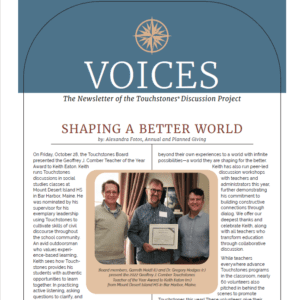
At Touchstones, we are always looking to expand awareness of and access to our programs, and we strive to engage students and teachers in inclusive and discussion-based education models they may not otherwise know about. In the past, some community initiatives we’ve launched to reach new audiences included Touchstones Week, Frankenreads, and partnering with the Anne Arundel County NAACP to celebrate their Founder’s Day. Since the pandemic began, we’ve run an open discussion program every other Saturday to explore what it means to be part of a community. (All are welcome, so please ask us how to join!)
Community engagement is an important part of our mission at Touchstones, and it inspired us to develop and offer discussion lessons linked to Sandra Cisneros’ anthology of short stories, The House on Mango Street. This collection of stories is told from the point of view of a young Latinx girl, Esperanza, who moves to a new neighborhood in New York City. Her narrations and vignettes of city life raise questions about identity, belonging, friendship, family, and culture. These lessons are offered for free to encourage inclusive discussions everywhere!
The House on Mango Street is a critically acclaimed book and was selected by the National Endowment for the Arts as one of the Big Read books for the 2021-2022 year. The NEA Big Read is a partnership with Arts Midwest, which seeks to “broaden our understanding of our world, our communities, and ourselves through the joy of sharing a good book.” The Big Read initiative provides funding opportunities for libraries, schools, and other organizations to support community programs that “inspire conversation and discovery.”
We elected to develop lessons to accompany one of the Big Read books to augment the positive impact that inclusive discussions on important themes can have—in all communities nationwide. These Touchstones lessons provide teachers, students, and other groups in afterschool and enrichment programs with structured discussion plans and worksheets that invite all participants to assume active roles in their own communities of learners. Each lesson is available in English and Spanish and provides an introduction, detailed lesson guide, questions for discussion, and a student worksheet. We want to introduce as many students as possible to the transformative nature of a Touchstones discussion, as well as to increase awareness and recognition of Touchstones programs by educators and others working with youth. We also hope to provide additional ways for teachers already using Touchstones to engage with their students. We know that when we support educators—especially when many are still dealing with COVID restrictions and related teaching challenges—that we support their students!



 Join the
Join the